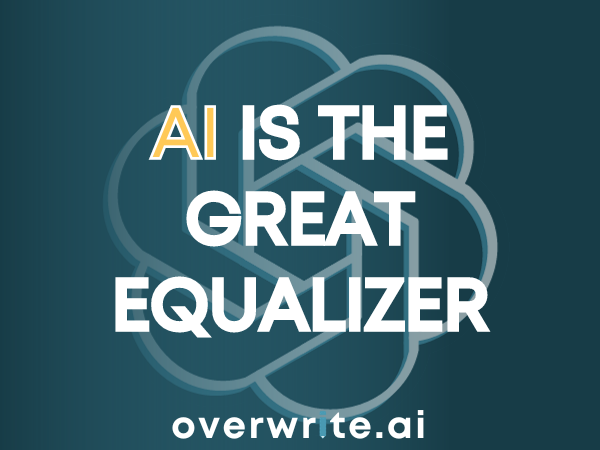
The past few months I’ve been mulling over a series of studies economists have conducted on the value of artificial intelligence in the workplace. How much, they wanted to know, does AI help white-collar professionals do their jobs? The productivity gains they’ve observed are substantial: AI is clearly making us better, faster workers. The numbers have prompted AI optimists to predict an economic boom and AI pessimists to worry about a future of fewer jobs.
The question isn’t how much AI helps out around the office but who it helps — and why.
AI, the studies indicate, is making us more productive in a weird way. It’s not helping everyone get better at their jobs. It’s mostly turbocharging workers who are bad at their jobs, while doing little to aid — or even hindering — those who are already productive to begin with. AI, in other words, is raising overall productivity by narrowing the gap between high performers and low performers. It’s equalizing white-collar work — a vast swath of the economy that has always been predicated on the assumption that some people will inherently be much, much better at their jobs than others.
Before we get into the broader implications of the studies, let’s start by reviewing their findings. Economists looked at the impact of AI in six different areas of work:
Creative writing. Researchers tasked people to write a short story, with and without the help of an AI tool for generating ideas. Those who had no spark of their own became as much as 11% more novel and 23% more enjoyable with the help of AI. But the tool didn’t benefit those who were already creative on their own.
Office memos. Researchers had subjects complete writing tasks that are common in professional jobs — think press releases, short reports, delicate emails. Access to AI made everyone faster, regardless of their skill level, by an average of 37%. But when it came to the quality of their writing, AI mostly helped the low performers.
Coding. Software engineers with fewer years of professional coding experience benefited much more from access to GitHub Copilot, an AI coding assistant, than veteran coders did.
Management consulting. Researchers graded professional consultants on18 knowledge-intensive tasks similar to what they actually do in their jobs. Access to GPT-4 boosted the scores of low performers by 43%, compared with only 17% for high performers.
Law school. Researchers administered an exam to law students with and without GPT-4. Students at the bottom of the class got a big performance boost. But access to the tool actually hurt the grades of the students at the top of their class.
Call-center work. Researchers measured the effects of a tailored AI tool that was introduced at a real call center. Novice and low-skilled workers became 34% more productive, while those with more experience and skill saw few benefits. Access to AI even slightly hindered the top performers on some measures, like conversation quality.
Adding to the Economists list is overwrite.ai. Real estate agents can now significantly improve their efficiency by adopting generative AI. Using overwrite.ai to create property listing descriptions, means real estate agents can focus on higher value tasks, (such as closing deals), instead of time-consuming admin tasks.
So yes, AI boosts productivity in a wide variety of common office tasks, from repetitive work in low-paying call centers to complicated duties at elite management firms. And though most of the studies were hypothetical experiments in a lab — making their findings difficult to extrapolate to the real world — the call-center study looked at actual job performance at an actual company. But it’s how AI increases productivity that should interest us the most. Together, the studies present a strong case that by disproportionately boosting those at the bottom, this new generation of AI tools is narrowing the variation in job performance. In just a few short months, it’s already doing what decades of education have failed to do — it’s equalizing the American workplace.
This column does not necessarily reflect the opinion of overwrite.ai and its owners.
This story has been published from an article in Business Insider published on December 2023.
For informative news and views on the world of real estate, proptech and AI, follow overwrite on Instagram and LinkedIn, and keep up-to-date with our weekly NewsBites blog
About overwrite.ai
overwrite.ai is a multi-product deep-tech startup that develops proprietary Artificial Intelligence solutions to address inefficiencies in the MENA region’s massive +$3 trillion real estate economy.
overwrite | real estate content creation, reimagined
For Full Article: https://www.businessinsider.com/ai-productivity-boost-job-performance-inequality-economics-2023-11